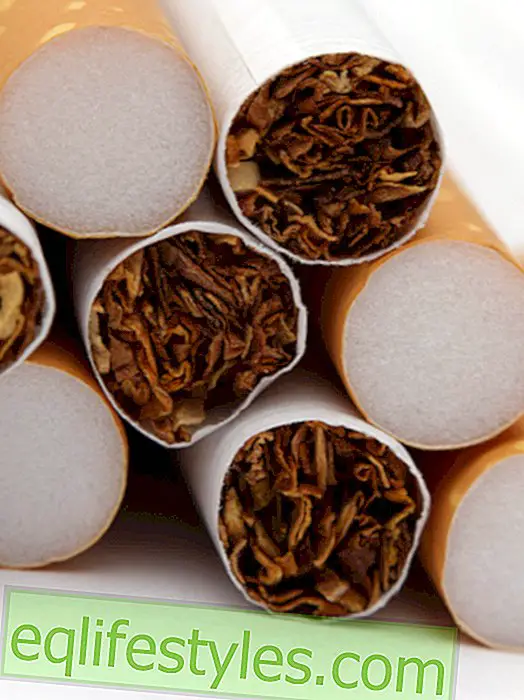Most people are not very familiar with the lymphatic system. Only if we have thick swollen lymph nodes, we realize: There's something wrong, maybe the next cold will start.

Photo: iStock
- The lymphatic system career of our health
- The immune system is only as strong as the lymphatic system
- Lymphatic and immune systems form a single entity
- Neck: the main portal of entry for pathogens
- What our eyes tell about our health
- Which constitution type am I?
- Children are particularly vulnerable
- How can I support my lymphatic system?
- Gentle help from nature
Our ignorance is a great pity in that lymphatic system is very important to our body and lymphatic drainage support could even protect us from the onset of disease!
The lymphatic system - career of our health
The lymph is a mostly clear, watery liquid. It is formed from the tissue fluid, taken up into the lymphatic vessels and then transported to the heart via ever-expanding lymph channels. Deposits are removed from the tissue with the lymph. It therefore has an important drainage and cleaning function.
The immune system is only as strong as the lymphatic system
Lymphatic vessels traverse our entire body as a transport system. As filter stations the lymph nodes are interposed. Here the defense reactions are coordinated. The lymph nodes contain immune cells that control the lymphatic fluid and ensure that an optimal defense response to pathogens can be initiated quickly.
Humans have about 600 lymph nodes that concentrate in specific body regions. These are:
- Inguinal lymph nodes for the control of the lymph from the legs and lower abdomen
- Armpit lymph nodes for the lymph from the arms and chest area
- Cervical lymph nodes for the lymph from the head area
Lymphatic and immune systems form a single entity
In every defense reaction, the lymphatic system runs to full speed. This is noticeable, for example, because the otherwise inconspicuous lymph nodes swell up and become clearly palpable, perhaps even visible.
Neck: the main portal of entry for pathogens
Through the mouth and nose, most pathogens enter our body. Therefore, a proper defense ring was built around this portal of entry: In the tonsils, the mucous membranes in the neck area and the neck lymph nodes immune cells are stationed, which examine all substances that enter the body and destroy them immediately if they are recognized as potential pests. First, you feel it because the mucous membranes swell up, nose and throat "go".
If the immune system is not strong enough to ward off the pathogens successfully, it leads to a mostly painful inflammation (sore throat, angina, tonsillitis), which can also spread to the respiratory tract (cough, bronchitis). A cold has us under control: Our immune system struggles with all its forces and we suffer from the effects.
What our eyes tell about our health
Fascinatingly, it is actually possible to use external characteristics to draw conclusions about our health or the propensity for certain diseases. Decisive for this is our constitution. These are the characteristic plants and characteristics with which we come into the world. Some people are born with a weak constitution and are therefore more susceptible to disease.

Photo: iStock
Indications of our constitution are given by our temperament, physique and skin, hair and eye color. Since, for example, melancholic people tend to have other illnesses than choleric ones, it can make sense to treat these different types of people differently from a medical point of view.
Comprehensive conclusions about our constitution are also the practiced look in the eye. The nature of certain areas of the iris in a reflex-zone-like manner suggests specific organ functions. In addition, conclusions about the condition of the nervous system can be drawn. On the basis of the so-called iris diagnostics one can classify constitution types among other things as follows:
- lymphatic
- choleric
- digestive type
Which constitution type am I?
♦ Blue eyes
People with blue eyes, blond hair and a tendency to accumulated infections are often classified as lymphatic constitution type. Central Europeans of the lymphatic constitution type are prone to recurrent infections in the ENT and urinary tract. Cradle cap often occurs as early as infancy and there is a tendency to skin reactions later on.
♦ Brown eyes
Typical of the choleric constitution type are brown eyes and an exuberant temperament. Cholerics are easily irritable and their environment often suffers from the proverbial exuberant bile. It is said that choleric people like to annoy themselves and others. They are usually spirited and often have dark eyes and dark hair. Problems of the digestive organs (especially liver / bile) as well as the veins often cause them problems.
♦ Bicolor eyes
Characteristic of the so-called digestive types is that the pupil is brown inside and brighter to the outside. Sometimes diarrhea, sometimes constipation, nausea, acid regurgitation, pressure after eating: Many complaints about digestion make this guy to create.
Children are particularly vulnerable
Every infection trains the immune system, because in the course of a defense reaction so-called memory cells are formed. With their help, our body's defenses are ready much sooner at the next contact with the same pathogen. The defense cells can then destroy the pathogens before we get sick. This effective system must first mature. That's why children are even more vulnerable to infections. Constantly swollen mucous membranes, tonsils, lymph nodes and the eternal snot-noses are on the agenda and many a child coughs from infection to infection.
This phenomenon is especially common in blond and blue-eyed children. The cause for this is the lymphatic constitution, ie the congenital increased readiness of the skin and the mucous membranes, which can be attributed to the "weak point lymphatic system".
The first signs of this increased disease readiness may already occur in the infant in the form of milk scab. Larger children then show a tendency to dry skin rashes. Particularly common are recurring colds, often swollen lymph nodes, tonsillitis and bronchitis. Antibiotic supplements then seem to be the only effective therapy.
But considering that the root cause of common infections is increased lymphatic organ disease readiness, antibiotic treatment may sometimes be avoided by supporting the lymphatic system.
How can I support my lymphatic system?
Important for a strong lymphatic system, which reliably protects us from infections, is a wholefood diet with many nutrients. In addition, a lot of exercise, sun and fresh air are important for strong defenses. Gentle movement in the form of swimming is ideal for promoting the lymphatic system. Our lymphatic system is also happy about relaxation, as long-term stress has a negative effect on many body functions - including lymphatic drainage and defenses.
For existing lymphatic drainage disorders, high-altitude exercise and gentle pressure are helpful. This pressure can be built up, for example, with compression stockings. Also helpful is manual lymphatic drainage. The lymph flow is stimulated with slow and rhythmic pumping strokes. These must be carried out by specialists.
Gentle help from nature
The drainage and defense function of our lymphatic system can also be gently supported by homeopathic medicines. There is a large selection of medicinal plants that can have a very positive effect on the lymph, for example dandelion, coneflower, hemlock or calendula, also known as calendula.

Photo: Pascoe
♦ The dandelion is considered in natural medicine as a metabolism-stimulating universal detoxification plant: It is used when diseases are due to environmental toxins, lack of resilience and a sluggish metabolism. It stimulates liver function. The liver is the metabolism and detoxification center of the body. This explains why the fresh green leaves are recommended for blood-purifying spring cure - such as salad prepared or in the form of plant press juice.
♦ The purple-flowered sun hat alias Echinacea purpurea belongs to the most well-known medicinal plants at all. Many natural medicines for defense strengthening contain Echinacea. Originally, all Echinacea species originated from North America and had a wide field of application with the local Indian tribes: externally for wounds, inflammations, burns and insect bites. Internally they found use in pain, colds, infectious diseases, but also in snake bites and other poisoning. The roots were chewed for toothache and sore throat. From today's strictly scientific point of view, only the herb extract of Echinacea purpurea is recognized as effective and contained in approved herbal medicines. Appropriate medicines are used to treat recurring respiratory and urinary tract infections, as well as superficial, poorly healing wounds. Even in its homeopathic form, Echinacea has a strengthening effect on the body's defenses and is therefore included in many medicines that stimulate the lymphatic and immune systems.

Photo: Pascoe
♦ The hemlock is only used in homeopathic dosage because of its toxicity. It is said to have a healing and analgesic effect, which can help with, for example, lymph node swelling and general discomfort.
♦ The marigold is considered a sunny wonder in wounds. The name marigold refers to the ring-shaped seed. Known is the flowering in every cottage garden plant as marigold, gold rose and solstice flower. Calendula is one of the most important and well-known medicinal plants. As a Ringella she was often mentioned by Hildegard von Bingen. The most important field of application has always been the promotion of wound healing. The marigold is considered the "mild" form of arnica. Because of its anti-inflammatory, wound healing, decongestant and antimicrobial effect, it is included in many healing ointments.









